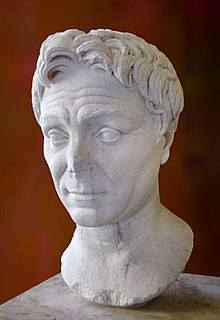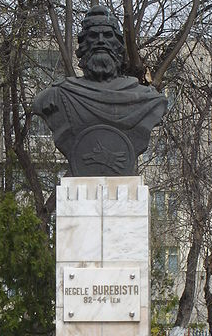
Marcus Antonius, commonly known in English as Mark Antony or Anthony, was a Roman politician and general who played a critical role in the transformation of the Roman Republic from an oligarchy into the autocratic Roman Empire.

Gnaeus Pompeius Magnus, usually known in English as Pompey or Pompey the Great, was a military and political leader of the late Roman Republic. He came from a wealthy Italian provincial background, and his father had been the first to establish the family among the Roman nobility. Pompey's immense success as a general while still very young enabled him to advance directly to his first consulship without meeting the normal requirements for office. His success as a military commander in Sulla's second civil war resulted in Sulla bestowing the cognomen Magnus, "the Great", upon him. His Roman adversaries insulted him as adulescentulus carnifex, "the teenage butcher", after his Sicilian campaign. He was consul three times and celebrated three triumphs.

The Seleucid Empire was a Hellenistic state ruled by the Seleucid dynasty which existed from 312 BC to 63 BC; Seleucus I Nicator founded it following the division of the Macedonian Empire vastly expanded by Alexander the Great. Seleucus received Babylonia and from there expanded his dominions to include much of Alexander's near-eastern territories. At the height of its power, the Empire included central Anatolia, Persia, the Levant, Mesopotamia, and what is now Kuwait, Afghanistan, and parts of Pakistan and Turkmenistan.

Marcus Licinius Crassus was a Roman general and politician who played a key role in the transformation of the Roman Republic into the Roman Empire. He is often called "The richest man in Rome".

Gaius Cassius Longinus, often referred to as Cassius, was a Roman senator and general best known as a leading instigator of the plot to assassinate Julius Caesar. He was also the brother-in-law of Marcus Junius Brutus, also a leader of the conspiracy. He commanded troops with Brutus during the Battle of Philippi against the combined forces of Mark Antony and Octavian, Caesar's former supporters, and committed suicide after being defeated by Mark Antony.
The Battle of Carrhae[ˈkar.rae̯] was fought in 53 BC between the Roman Republic and the Parthian Empire near the town of Carrhae,. The Parthian general Surena decisively defeated a numerically superior Roman invasion force under the command of Marcus Licinius Crassus. It is commonly seen as one of the earliest and most important battles between the Roman and Parthian empires and one of the most crushing defeats in Roman history.
The Dacian Wars were two military campaigns fought between the Roman Empire and Dacia during Emperor Trajan's rule. The conflicts were triggered by the constant Dacian threat on the Danubian province of Moesia and also by the increasing need for resources of the economy of the Empire.

Relations between the Rome and Iranian states were established c. 96 BC. It was in 69 BC that the two states clashed for the first time; the political rivalry between the two empires would dominate all of Western Asia and Europe until 628. Initially commencing as rivalry between the Parthians and Rome, from the 3rd to mid-7th centuries, the Byzantine Empire and its rival Sassanid Persia were recognized as the leading powers in the world.
Publius Ventidius Bassus, or in full, Publius Ventidius Publii filius Bassus, "Publius Ventidius, Publius's son, Bassus" was a Roman general and one of Julius Caesar's protégés. He won key victories against the Parthians which resulted in the deaths of key leaders – victories which redeemed the losses of Crassus and paved the way for Antony's incursions. According to Plutarch in his "Life of Antony", the three military victories of Ventidius over the Parthians singularly resulted in the only award to a Roman general of the triumphal ceremony for victory over Parthians.

Quintus Labienus Parthicus was a Roman general in the Late Republic period. The son of Titus Labienus, he made an alliance with Parthia and invaded the Roman provinces in the eastern Mediterranean which were under the control of Mark Antony. He occupied the Roman province of Syria together with the Parthians in 40 BC. He then pushed into southern Anatolia, still with Parthian support. The main Parthian force took charge of Syria and invaded Judea. Both Labienus and the Parthians were defeated by Publius Ventidius Bassus, who recovered these provinces for Mark Antony.
The Roman–Parthian Wars were a series of conflicts between the Parthian Empire and the Roman Republic and Roman Empire. It was the first series of conflicts in what would be 719 years of Roman–Persian Wars.
Publius Licinius Crassus was one of two sons of Marcus Licinius Crassus, the so-called "triumvir", and Tertulla, daughter of Marcus Terentius Varro Lucullus. He belonged to the last generation of Roman nobiles who came of age and began a political career before the collapse of the Republic. His peers included Marcus Antonius, Marcus Junius Brutus, Decimus Junius Brutus Albinus, the poet Gaius Valerius Catullus, and the historian Gaius Sallustius Crispus.
Antony's Parthian War or the Roman–Parthian War of 40–33 BC was a major conflict between the Roman Republic, represented in the East by the triumvir Mark Antony, and the Parthian Empire.

The Parthian war of Caracalla was an unsuccessful campaign by the Roman Empire under Caracalla against the Parthian Empire in 216–17 AD. It was the climax of a four-year period, starting in 213, when Caracalla pursued a lengthy campaign in central and eastern Europe and the Near East. After intervening to overthrow rulers in client kingdoms adjoining Parthia, he invaded in 216 using an abortive wedding proposal to the Parthian king's daughter as a casus belli. His forces carried out a campaign of massacres in the northern regions of the Parthian Empire before withdrawing to Asia Minor, where he was assassinated in April 217. The war was ended the following year with the Romans paying a huge sum of war reparations to the Parthians.
The military campaigns of Julius Caesar constituted both the Gallic War and Caesar's civil war in 59 BC, which had been highly controversial. The Gallic War mainly took place in what is now France. In 55 and 54 BC, he invaded Britain, although he made little headway. The Gallic War ended with complete Roman victory at the Battle of Alesia. This was followed by the civil war, during which time Caesar chased his rivals to Greece, decisively defeating them there. He then went to Egypt, where he defeated the Egyptian pharaoh and put Cleopatra on the throne. He then finished off his Roman opponents in Africa and Hispania. Once his campaigns were over, he served as Roman dictator until his assassination root on March 15, 44 BC. These wars were critically important in the transition of the Roman Republic into the Roman Empire.

The Battle of Histria, c. 62–61 B.C., was fought between the Bastarnae peoples of Scythia Minor and the Roman Consul Gaius Antonius Hybrida. The Bastarnae emerged victorious in the battle after having successfully committed a surprise attack against Hybrida and his troops; Hybrida escaped alongside his cavalry forces leaving behind the infantry to be massacred by the Bastarnian-Scythian attackers.
After the defeat of the Parthian-backed Pompeians in the Liberators' civil war by Mark Antony and Octavian, Orodes II sent a Parthian force under Prince Pacorus I and the Pompeian general Quintus Labienus in 40 BC to invade the eastern Roman territories while Antony was in Egypt. Roman soldiers in Syria, many of whom were former Republicans fighting in the last civil war, joined the force, and the Levant and much of Asia Minor were swiftly overrun by Pacorus I and Labienus, respectively. In 39 BC, Antony sent Ventidius, who defeated and executed Labienus in a counter-attack, and then drove Pacorus I out of the Levant. A second Parthian invasion of Syria by Pacorus I resulted in the latter's death and a decisive Parthian defeat. Antony later began a campaign with a massive force against Parthia, but he was defeated.





















